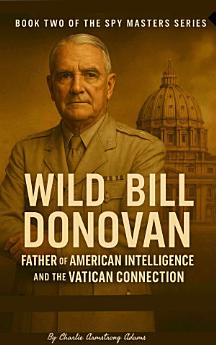Wild Bill Donovan: Father of American Intelligence and the Vatican Connection
About this ebook
Book Two of the Spy Masters Series
He was the Medal of Honor recipient who became America’s most famous spymaster—William “Wild Bill” Donovan, the man who built the OSS, blueprint for today’s CIA. Trusted by FDR, respected by Churchill, feared by his enemies, Donovan’s story is a gripping journey from the Irish Catholic streets of Buffalo to the Vatican’s secret corridors and the frontlines of global espionage.
In Wild Bill Donovan: Father of American Intelligence and the Vatican Connection, discover how a man of faith and ambition forged alliances with MI6, tapped into Catholic resistance networks, and used the Vatican as a neutral hub for intelligence during World War II. Yet, in Washington, his Catholic ties stirred suspicion—fueling whispers in Congress and opposition from J. Edgar Hoover, who feared Donovan’s reach.
This explosive biography—Book Two in the acclaimed Spy Masters Series—dives deep into Donovan’s heroism, vices, and political battles. From womanizing and heavy drinking to daring covert missions across Europe, North Africa, and Asia, Donovan lived a life as dangerous off the battlefield as on it. Awarded the Order of St. Sylvester by Pope Pius XII, he stood at the nexus of faith and espionage, making him both an invaluable asset and a lightning rod for controversy.
You’ll uncover:
How the OSS became the seedbed of the CIA
The role of Vatican channels in wartime intelligence
Secret alliances with MI6 and global resistance networks
Political turf wars, smear campaigns, and the battle for postwar intelligence control
Perfect for readers of espionage history, Vatican intrigue, and wartime intelligence, this is the untold story of a man who shaped American spycraft—and whose shadow still looms over the CIA today.
The world knew him as a hero. Washington knew him as a threat. History remembers him as both.
About the author
Charlie Armstrong Adams is an independent researcher and writer focused on intelligence history, covert operations, and state power. His works explore the hidden intersections between surveillance, religion, and geopolitics, drawing connections from Cold War espionage to modern digital control systems. With a style that blends investigative detail and historical analysis, Adams aims to expose how secrecy, ideology, and psychological warfare shape both governments and everyday life.









